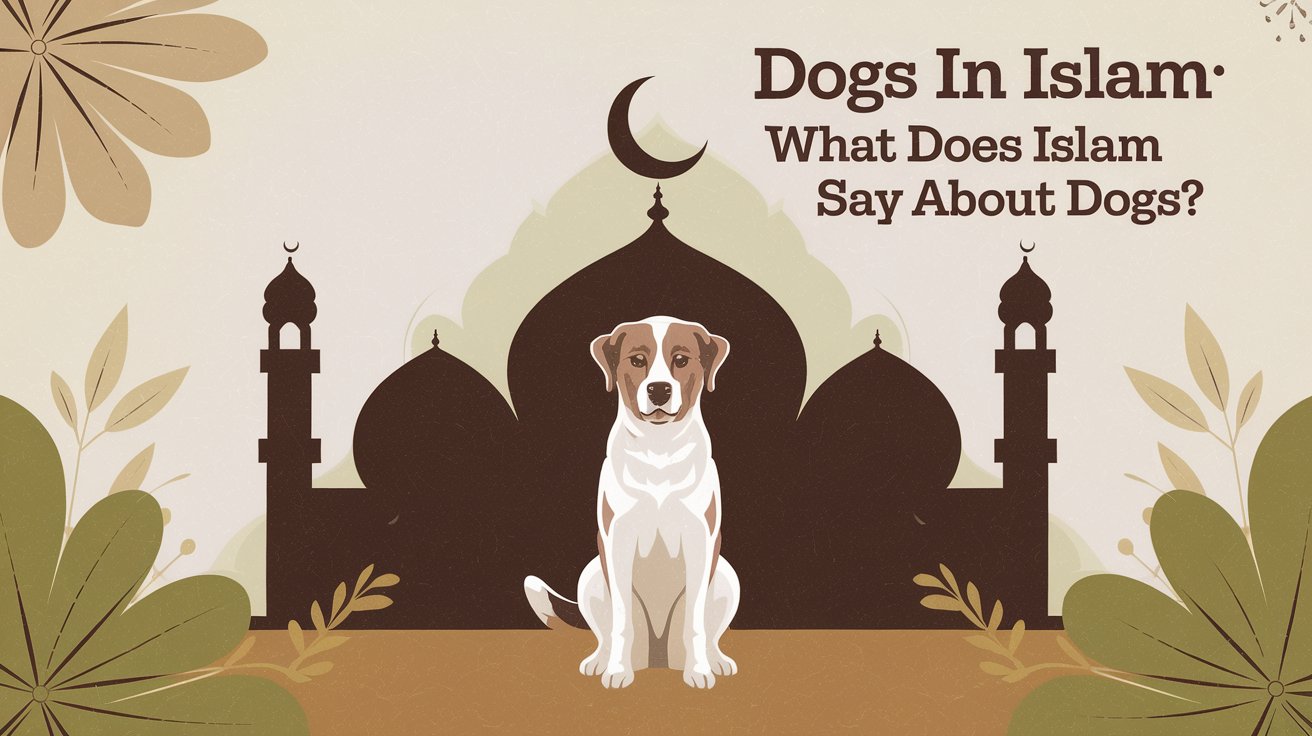Muslims often ask about dogs in Islam. While Islam respects dogs, but it gives specific rules about keeping and touching them. Prophet Muhammad (peace be upon him) taught us how to treat dogs through many Hadith. The Quran also guides us about dogs.
Today, many Muslims want to know if they can keep dogs, how to stay clean after touching them, and what Islam really says about these animals. Islam teaches us to be kind to dogs while following special rules about them. In this guide i will answer all questions about dogs according to Quran and Hadith.
Table of Contents
Are Dogs Haram in Islam?
Islamic law strictly forbids eating dog meat, but dogs themselves are not haram creatures. Dogs remain one of Allah’s creations and deserve our kindness and compassion. Muslims must follow specific rules about keeping and touching dogs, but this doesn’t make the animals themselves haram. Islamic teachings encourage Muslims to show kindness to all creatures, including dogs, while following proper guidelines about cleanliness and interaction.
Can Muslims Keep Dogs in Islam?
Islam provides specific guidelines about keeping dogs. Prophet Muhammad (peace be upon him) clearly stated in a Hadith narrated by Bukhari: “Angels do not enter a house where there is a dog or a picture.” This shows that keeping dogs inside homes without a valid reason prevents angels of mercy from entering the house.
However, Islam permits keeping dogs for legitimate purposes. In Surah Al-Ma’idah, verse 4, Allah says: “They ask you what is lawful for them. Say, ‘Lawful for you are good foods and [game caught by] what you have trained of hunting animals which you train as Allah has taught you.’” Additionally, Prophet Muhammad (peace be upon him) explained in another Hadith that Muslims can keep dogs for specific reasons like hunting, guarding crops, or protecting livestock.
Therefore, while Islam prohibits keeping dogs as pets merely for companionship or entertainment, Muslims can keep dogs for with some reasons:
- Hunting purposes
- Guarding livestock
- Protecting crops and fields
- Security of farms
In Islam, keeping a dog without any valid reason or just for fun is not permitted. This affects the spiritual blessings in our homes. However, when there is a genuine need as mentioned above, Muslims can keep dogs while following proper Islamic guidelines about cleanliness.
Can Muslims Touch Dogs in Islam?
Islam teaches specific rules about touching dogs. The Prophet Muhammad (peace be upon him) explained that if a dog licks a vessel, Muslims must wash it seven times, and the first washing should be with soil. This Hadith, narrated in Sahih Muslim, shows that Islam considers dog saliva as ritually impure (najis).
If you touch a wet dog or dog saliva gets on your clothes or body, you need to clean yourself in a special way:
- First, wash the area with soil or pure dirt mixed with water
- Then wash the same area six more times with clean water
However, touching a dry dog does not make a Muslim’s hands or clothes impure. You can pray if you touch a dry dog – no special cleaning is needed. Islam does not forbid touching dogs completely, but Muslims must follow these cleaning rules to maintain ritual purity for prayers.
While these rules exist, Muslims should still treat dogs with kindness. Prophet Muhammad (peace be upon him) told the story of Allah forgiving a person who gave water to a thirsty dog, showing that being kind to dogs can bring Allah’s rewards. Remember: The rules about dogs in Islam focus on ritual purity, not cruelty or hatred toward these animals.
Can Dogs See Angels?
No direct evidence exists in Islamic teachings about dogs seeing angels. However, Prophet Muhammad (peace be upon him) tells us in Sahih Bukhari and Muslim that some animals can see supernatural beings. He said: “When you hear the crowing of a rooster, ask Allah for His bounty because it has seen an angel. And when you hear the braying of a donkey, seek refuge with Allah from the devil because it has seen a devil.”
About dogs specifically, Prophet Muhammad (peace be upon him) said in another Hadith: “When you hear dogs barking at night, seek refuge in Allah, for they see what you do not see.” This tells us dogs can sense unseen creatures, likely jinns, but not necessarily angels.
We also know from authentic Hadith that angels of mercy avoid entering houses with dogs. This suggests that rather than seeing angels, dogs might actually prevent angels from being present.
As Muslims, we should be careful not to make claims without clear proof from the Quran or authentic Hadith. While dogs and some other animals may sense or see supernatural beings, we cannot say for sure if they see angels.
Will Allah Forgive Me for Having a Dog?
Keeping a dog is not a sin (gunah) in Islam. Allah and His Prophet Muhammad (peace be upon him) have only forbidden keeping dogs without a valid purpose. In Surah Al-Ma’idah, verse 4, Allah clearly permits keeping hunting dogs: “They ask you what is lawful for them. Say, ‘Lawful for you are good foods and [game caught by] what you have trained of hunting animals which you train as Allah has taught you.’”
Prophet Muhammad (peace be upon him) explained in a Hadith that while keeping dogs just for fun reduces daily rewards, it can be fixed through sincere repentance. He said: “Whoever keeps a dog, except for hunting, guarding livestock, or farming, will lose one qirat of their reward each day.”
If you have kept a dog without these valid reasons and feel guilty, remember that Allah is Most Merciful. The Quran says in Surah Az-Zumar, verse 53: “Say, O My servants who have transgressed against themselves [by sinning], do not despair of the mercy of Allah. Indeed, Allah forgives all sins. Indeed, it is He who is the Forgiving, the Merciful.”
Simply stop keeping dogs as pets without purpose, sincerely ask Allah for forgiveness, and follow the proper Islamic guidelines about dogs in the future.
Does Allah allow dogs in Jannah?
The Quran and authentic Hadith do not directly tell us if dogs will be in Jannah (Paradise). We only know from Islamic teachings that Jannah will have everything that brings joy and happiness to its people, as Allah says in the Quran (Surah Qaf, verse 35): “They will have whatever they wish therein.” Prophet Muhammad (peace be upon him) mentioned several animals that will enter Jannah, like the whale that swallowed Prophet Yunus, Prophet Sulaiman’s ant, and Al-Buraq.
However, no authentic Hadith specifically mentions dogs in Paradise. As Muslims, we should avoid making claims about Paradise without clear evidence from the Quran or authentic Hadith. What we do know is that Allah will reward those who treated His creatures, including dogs, with kindness in this world. Remember, Allah knows best what He has prepared for the believers in Paradise.
Which dog is mentioned in Surah Kahf?
Allah mentions a faithful dog in the story of the People of the Cave (Ashab al-Kahf) in the Quran. This dog stayed with the young men who fled to protect their faith. Allah says in Surah Al-Kahf, verse 18: “And their dog stretching forth his two forelegs at the entrance of the cave.” The Quran mentions this dog again in verse 22: “They will say they were three, and their dog was the fourth.”
While the Quran doesn’t tell us the dog’s name, this story shows that even a dog can be part of a blessed group. Islamic scholars point out that Allah honored this dog by mentioning it in the Quran several times because it stayed loyal to these righteous young men.
The story teaches us two important lessons:
- Allah can bless any of His creatures, even a dog, when it serves a good purpose
- Good company benefits everyone – even the dog gained honor by staying with righteous people
This Quranic story proves that while Islam has specific rules about keeping dogs, they aren’t inherently bad creatures. Instead, this dog became part of one of the most amazing miracles mentioned in the Quran.
Which dog breed is mentioned in the Quran?
The Quran does not mention any specific dog breed. Even in the story of the People of the Cave (Ashab al-Kahf), where Allah mentions a dog, He does not tell us its breed. Prophet Muhammad (peace be upon him) also did not specify any particular dog breeds in his teachings.
However, historical sources suggest that hunting dogs and guard dogs were common in Arabia during the time of Prophet Muhammad (peace be upon him). The Saluki breed, also known as the Arabian Greyhound, was one of the most common dogs used for hunting in that region. But this is historical information, not religious evidence.
Did Prophet Muhammad (peace be upon him) Pray in the Presence of Dogs?
According to authentic Hadith, Prophet Muhammad (peace be upon him) did not pray in the presence of dogs. In fact, he taught Muslims that dogs can interrupt prayers. In a Hadith reported in Sahih Muslim, he said that a prayer gets interrupted by three things passing in front of someone who is praying: “a woman, a donkey, and a black dog.”
In another Hadith narrated by Abu Dawud, Prophet Muhammad (peace be upon him) instructed that dogs should not be kept in places of prayer. This is one reason why you won’t find dogs in mosques. Angels of mercy, who are present during prayers, do not enter places where dogs are kept.
If a dog enters while someone is praying, Islamic scholars say the person should:
- Try to move the dog away if possible
- If they can’t move the dog, they should try to move to another spot
- If neither is possible, they should complete their prayer and repeat it later
This teaching shows why Muslims should keep their prayer areas free from dogs, though Islam still requires us to treat dogs with kindness in other settings.
Does a Dog Break Wudu?
Simply touching a dry dog does not break your wudu (ritual ablution). However, if a dog’s wet mouth, saliva, or any wet part touches you, you need to clean that area before praying, but your wudu remains valid.
Are Muslims allowed to see dogs?
Yes, Muslims can see and interact with dogs. Islam doesn’t forbid looking at or being around dogs. Prophet Muhammad (peace be upon him) only gave specific rules about touching dogs and keeping them as pets. Muslims should treat dogs with kindness while following Islamic guidelines about cleanliness and pet ownership.
Do I Have to Do Ghusl if a Dog Licks Me?
No, you don’t need to perform ghusl (full body ritual bath) if a dog licks you. Prophet Muhammad (peace be upon him) taught us the specific cleaning method: wash the area where the dog’s saliva touched seven times, with the first washing using clean soil mixed with water.
Key points:
- Only wash the specific area touched by dog saliva
- Wash seven times
- Use soil for first wash
- Use clean water for remaining washes or a soap and shampoo
- Regular wudu is enough for prayer after cleaning
- No need for full ghusl
Remember: Dog saliva is considered ritually impure (najis) but doesn’t require the same level of purification as major impurities that need ghusl.










